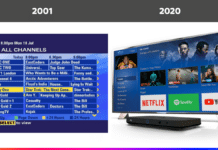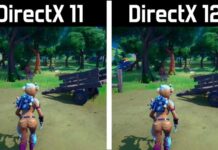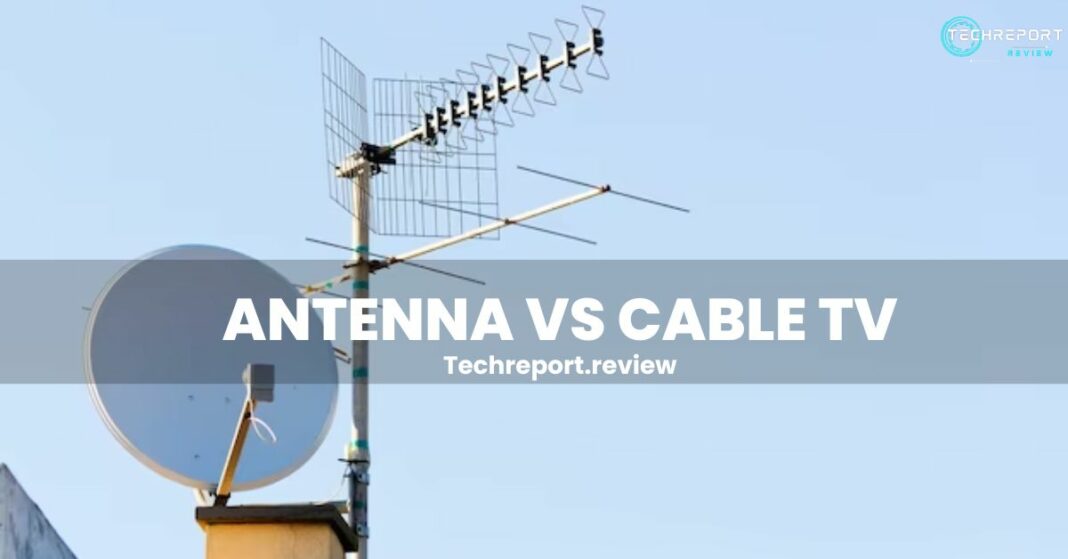The Great Debate: Antenna vs Cable TV
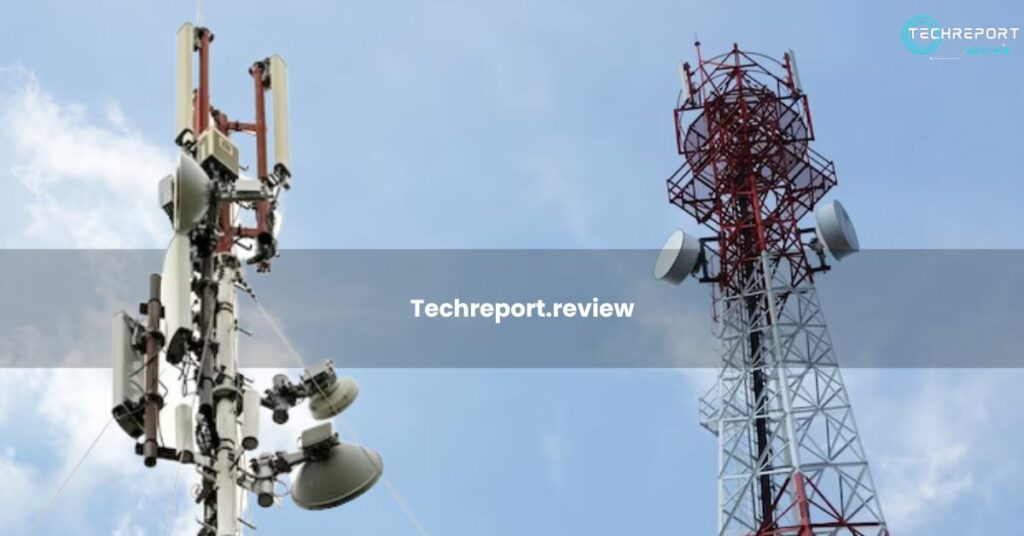
Antenna and cable TV are two of the most popular options for watching television. An antenna is a device that captures over-the-air TV signals and broadcasts them to your TV. On the other hand, cable TV is a service that provides a variety of channels through a wired connection to your TV.
Choosing the right option between antenna and cable TV can be a daunting task, especially for those who are new to the world of TV viewing. It is important to choose the right option that suits your needs, preferences, and budget.
The purpose of this article is to help readers understand the key differences between antenna and cable TV, and guide them to choose the best option for their needs. We will provide an in-depth comparison of these two options, covering factors like cost, available channels, picture quality, and more. By the end of this article, readers will have a clear understanding of which option is best for them.
Antenna vs. Cable: Technical Differences
Antenna TV is a type of television broadcasting system that transmits over-the-air television signals using an antenna. It uses a digital signal that allows for high-definition television (HDTV) broadcasts. Cable TV, on the other hand, is a paid television service that uses cable lines to deliver a range of channels, including local and national networks, sports, news, and other programming.
Antenna TV is known for providing high-quality pictures and sound. The digital signal that is used to transmit the television signal results in a clear and crisp image, even for channels that are not broadcast in HD. Cable TV, on the other hand, may offer better picture quality than antenna TV, but it largely depends on the service provider and the type of package that you choose.
Antenna TV broadcasts over the air and uses a limited amount of bandwidth. This means that it can only broadcast a limited number of channels, usually ranging from 10 to 20. Cable TV, on the other hand, has a much larger bandwidth and can offer a wider range of channels, usually ranging from 50 to 200 channels.
To receive an antenna TV, you need an antenna that is compatible with your television set. Depending on the type of antenna you choose, you may also need additional equipment like a signal booster or an amplifier. Cable TV requires a set-top box or a cable card that is provided by the cable company. In some cases, you may also need a cable modem for internet service.
Overall, understanding the technical differences between antenna and cable TV can help you make an informed decision about which option is best for your needs.
Antenna vs. Cable: Cost and Availability
When it comes to cost, an antenna is typically the more affordable option compared to cable TV. With an antenna, you can receive over-the-air broadcasts for free, without any monthly subscription fees. On the other hand, cable TV requires a monthly subscription, and the cost varies depending on the package and provider. Additionally, cable TV often comes with additional fees, such as equipment rental fees, installation fees, and early termination fees.
Antenna TV is available virtually everywhere, as long as you have a TV and a signal. You can purchase an antenna from any electronics store and set it up yourself without the need for a professional installer. However, the number of channels you can receive with an antenna depends on your location and signal strength. On the other hand, cable TV is not available everywhere and requires a wired connection to your home. Cable TV providers may not offer their services in all areas. And even in areas where cable is available, some residents may not have access due to infrastructure limitations.
While cable TV may offer more channels and options, it comes with hidden costs that can quickly add up. Cable TV providers often advertise low prices, but these prices are often introductory rates that increase after a certain period. Additionally, cable TV providers may charge for equipment rentals, installation fees, and additional channels. Over time, these costs can add up to a significant amount, making cable TV more expensive than an antenna.
Antenna vs. Cable: Channel Selection
When it comes to channel selection, Antenna, and Cable TV have some differences that are worth noting. Here’s what you need to know:
Cable TV usually offers a wider selection of channels compared to Antenna TV. Cable TV providers typically offer a range of packages that include channels across different genres, from sports to movies and news. Antenna TV, on the other hand, offers a limited selection of channels, with most of them being local channels.
Antenna TV is a great option for viewers who want to access their local channels without paying a monthly fee. Most major cities have a range of local channels that can be accessed with an antenna, including ABC, NBC, CBS, and FOX. In contrast, Cable TV providers may not offer all of the local channels in every area, and the availability of local channels may vary depending on the package and the location.
When it comes to premium channels, Cable TV is the clear winner. Cable TV providers offer a range of premium channels like HBO, Showtime, and Starz as part of their packages, which are not available on Antenna TV. However, viewers who don’t want to subscribe to Cable TV can still access premium channels through streaming services like Hulu, Netflix, and Amazon Prime Video.
Overall, the choice between Antenna and Cable TV for channel selection largely depends on the viewer’s preferences. While Cable TV may offer more channel options, Antenna TV is a great choice for viewers who want to access their local channels without paying a monthly fee.
Antenna vs. Cable: Installation and Setup
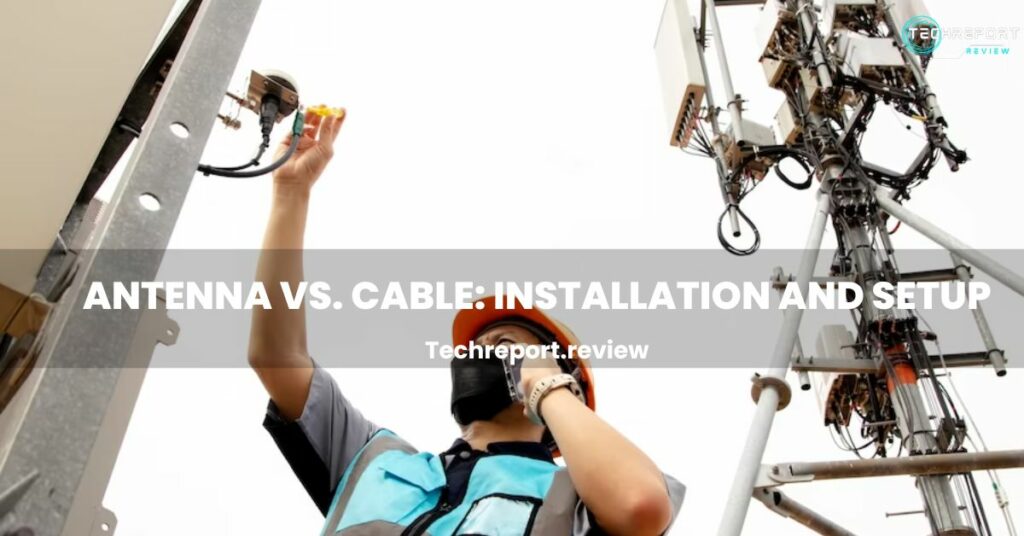
Installing and setting up an antenna and cable TV are two different processes. Cable TV requires a technician to come to your home and install the cable box and cables. Antenna installation is typically a DIY project, and it can be installed inside or outside the home.
To install a cable TV, you need to call your cable provider and schedule an installation appointment. They will install the cable box and cables and activate the service. In contrast, antenna installation requires purchasing an antenna, mounting it on the roof or inside the house, and connecting it to your TV. Additionally, you may need a signal amplifier if you live far from the broadcast towers.
For cable TV, if you experience any issues with your service, you need to contact your cable provider for assistance. For antenna installation, you can troubleshoot the following common issues:
- Weak signal – this can be resolved by using a signal amplifier.
- Incorrect antenna placement – the antenna needs to be positioned in the right direction towards the broadcast towers for optimal reception.
- Damaged cables or connectors – any damage to the cables or connectors can affect the signal quality.
By troubleshooting these common issues, you can ensure that you have a seamless experience with your antenna or cable TV.
Antenna vs. Cable: Recording and On-Demand
Cable TV providers typically offer recording and on-demand services as part of their subscription packages. Most cable providers offer digital video recorder (DVR) services, which allow viewers to record and store their favorite TV programs for later viewing. In addition, cable TV providers usually offer on-demand services, which allow viewers to watch TV shows and movies at any time, usually for an additional fee.
On the other hand, antenna TV does not offer recording and on-demand options as part of their service. However, there are a few options for antenna TV viewers who want to record and store their favorite TV shows. These options include purchasing a separate DVR device or using a streaming service that offers cloud DVR storage.
Cable TV providers offer a wide range of on-demand options, including movies and TV shows, as part of their subscription packages. They also offer access to premium channels, which may not be available on antenna TV. In addition, cable TV providers typically offer live TV streaming options, allowing viewers to watch their favorite programs on their computers, smartphones, and other devices.
Antenna TV does not offer on-demand options as part of its service. However, there are a few options for antenna TV viewers who want to access on-demand content. Some streaming services, such as Hulu and Netflix, offer on-demand content that can be accessed through an antenna TV connection.
Cable TV providers offer a variety of DVR options, ranging from basic to advanced features. Most cable providers offer DVR service as part of their subscription packages, allowing viewers to record and store their favorite programs for later viewing. Some cable providers also offer cloud DVR services, which allow viewers to access their recordings from any device with an internet connection.
Antenna TV viewers who want to record and store their favorite TV shows have a few options. One option is to purchase a separate DVR device, which can be connected to an antenna TV setup. Another option is to use a streaming service that offers cloud DVR storage, which can be accessed through an antenna TV connection. However, it’s important to note that these options may come with additional costs and may not offer as many features as cable TV DVR services.
Antenna vs. Cable: Geographic Limitations
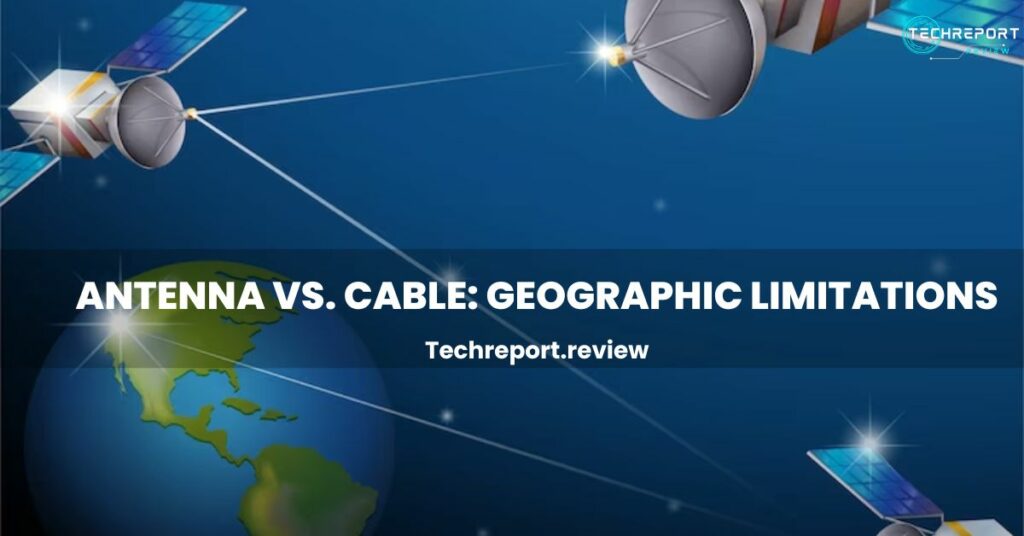
When it comes to TV viewing, the location plays an important role in determining the options available to you. Antenna and cable TV both have their limitations in terms of availability in different geographic locations.
Antenna TV relies on over-the-air signals to deliver TV channels. Which means that its coverage is limited by the strength and reach of the signal. While Antenna TV can be accessed in most urban areas. It may not be available in rural or remote locations where the signal strength is weak or non-existent.
On the other hand, cable TV is available in most urban and suburban areas. And its coverage is not limited by the strength of the signal. Instead, cable TV uses a wired connection to deliver TV channels. Which means it can be accessed in almost any location where the cables have been installed.
In rural areas, the availability of Antenna and Cable TV can vary significantly. While cable TV is more likely to be available in rural areas. It may not be available in some remote or sparsely populated locations. In such cases, Antenna TV may be the only option available for accessing TV channels.
Antenna and cable TV may also differ regarding the availability of international channels. While cable TV providers may offer a range of international media as part of their packages. Antenna TV may have limited or no access to international channels.
Overall, the geographic limitations of Antenna and Cable TV depend on a variety of factors, including the location and signal strength. It is important to research the options available in your area to determine the best option for your needs.
Antenna vs. Cable: Reliability and Future
When it comes to reliability, both Antenna and Cable TV have their pros and cons. Antenna TV relies on a clear signal from a nearby broadcast tower, which can be affected by weather conditions. Geographic location, and obstructions. In contrast, Cable TV uses a coaxial cable that is more stable and can deliver consistent signal quality even during inclement weather.
However, Antenna TV technology is rapidly advancing with the emergence of digital signals and the development of 4K Ultra High Definition (UHD) broadcasts. As these technologies become more widespread, Antenna TV is likely to offer even better picture quality than Cable TV.
On the other hand, Cable TV providers are constantly investing in new technologies to improve the reliability and quality of their service. For instance, some cable providers offer fiber optic networks that are more resilient to weather and other disruptions.
When deciding between Antenna and Cable TV, it’s important to consider your long-term needs and whether you are willing to invest in new technology as it becomes available.
Factors to consider when choosing between Antenna and Cable TV for long-term use include the following:
- Availability of local channels: If you live in a rural area or a location with limited access to broadcast towers, Antenna TV may not be a reliable option. Cable TV may be a better choice in such situations.
- Future technology trends: Antenna TV technology is evolving rapidly, and new technologies like 4K UHD broadcasts may make it a more attractive option for long-term use. However, Cable TV providers are also investing in new technologies, so it’s important to consider the long-term viability of both options.
- Cost: Antenna TV is typically cheaper than Cable TV, but it may require a higher upfront investment in equipment. Cable TV may be more expensive in the long run due to hidden costs like equipment rental fees and service charges.
Ultimately, the decision between Antenna and Cable TV depends on your individual needs and preferences. By considering the factors outlined in this article. You can make an informed decision that meets your needs and fits your budget.
In Crux
In conclusion, choosing between an antenna and cable TV depends on your specific needs and priorities. While cable TV offers a wider range of channels, better picture quality. And advanced features such as recording and on-demand options. It also comes with a higher cost and may have hidden fees. On the other hand, an antenna offers free access to local channels and has lower installation and setup costs, but the channel selection may be limited and it may not be available in all areas.
In terms of future developments, both antenna and cable TV technology are evolving. Cable TV is shifting towards online streaming services. While antennas are becoming more powerful and capable of receiving a broader range of channels.
Ultimately, the decision between antenna and cable TV comes down to your personal preferences and needs. If you prioritize a wide selection of channels and advanced features, cable TV may be the better option. However, if you want to save money and don’t mind a more limited channel selection. An antenna may be a good choice.
How much did you like Our detailed The Great Debate: Antenna vs Cable TV? Review Also, please share these Blogs with your friends on social media.
Related Blogs
[WPSM_AC id=840]



